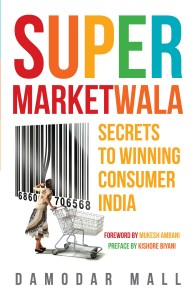 Supermarketwala: Secrets to Winning Consumer India
Supermarketwala: Secrets to Winning Consumer India
By Damodar Mall, Random House, September 2014
Supermarketwala is intended to be the go-to book for all consumer business enthusiasts and readers alike, who wish to understand how and why we as consumers behave in a certain manner at different places. These insights, which are the analyses of the sector so far, could become the pillars for shaping successful consumer products and retail businesses in the huge consumer economy that India will soon be.
Insightful not only for retail managers but also those who crave to understand consumer dynamics, the book starts with the early journey of modern Indian retail and pans out to the future delights on the canvas. Its USP is that it doesn’t rely on westernized beliefs and examples and brings out the much ‘Indian’ story of evolving consumer behavior.
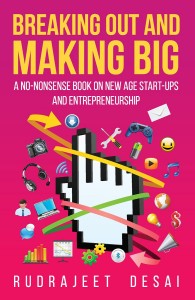 Breaking Out and Making Big: A No-Nonsense Book on New Age Start-Ups and Entrepreneurship
Breaking Out and Making Big: A No-Nonsense Book on New Age Start-Ups and Entrepreneurship
By Rudrajeet Desai, Collins Business, August 2014
Rudrajeet Desai offers simple, real-life, usable suggestions on how to build and manage start-ups. He begins with the question: do you have it in you to become an entrepreneur? And the answer lies within you. For entrepreneurship is not only about building a business, it is a way of life.
The book provides an in-depth analysis on evaluating business models, building a start-up team, becoming the perfect CEO, investments and venture capital, compliance and organizational structure, start-up culture and employee management and everything else you need to know about planning and implementing a new venture. Featuring smart suggestions and tips taken from the author’s own experience, this book could help you make that jump from vision to realization.
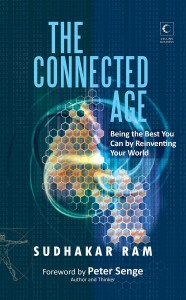 Connected Age: Being the Best You Can in the New World
Connected Age: Being the Best You Can in the New World
By Sudhakar Ram, Collins Business, February 2014
We live in an era of global warming, unsustainable lifestyles and profit-driven corporate behemoths that don’t care to engage with their employees. Sudhakar Ram, himself the captain of a multinational IT firm, identifies these as products of the Industrial Age. The only way out of this mess is what he envisions as the ‘Connected Age’.
Here, ‘connected’ is used not in the sense of telecommunication but in the sense of governments being more in touch with the people and the ecology and people in turn being more in touch with their own selves and each other. Drawing on the ideas of several modern thinkers including path-breaking architects, environmentalists, management gurus and futurists, Sudhakar Ram calls for dramatic changes in the way we run our lives, our companies and our planet itself so we can leave behind a better world for future generations.
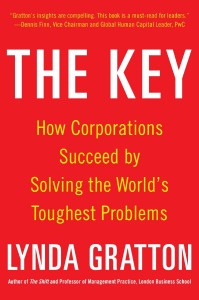 The Key: How Corporations Succeed by Solving the World’s Toughest Problems
The Key: How Corporations Succeed by Solving the World’s Toughest Problems
By Lynda Gratton, McGraw-Hill; June, 2014
Never before have corporations been so large, so wealthy, so powerful, and so rich in human creativity and endeavor. Organizational change expert Professor Lynda Gratton shows that it is now critical that these corporations step up to play a more positive role in the world by building inner resilience, actively anchoring themselves in their communities and supply chains, and leveraging their unique capabilities to address complex global challenges such as climate change and youth unemployment.
In The Key, Gratton maps out how bringing resilience to a fragile world starts with what happens inside a corporation—when intelligence and wisdom are amplified, emotional vitality enhanced, and social connections harnessed. She explains how corporations can leverage this inner resilience to help solve global problems and how a corporation’s unique innovative, scaling and mobilizing, and alliance building capabilities—are some of the tools for combating global ills.
Both realistic and optimistic, The Key is a practical guide that provides the rationale, strategies, and tools you need to not only spearhead resilience for your own company but also how to use this resilience to contribute to the betterment of the world. Building on her unique research base, Gratton provides insights from more than 20 companies from across the world including Vodafone, Unilever, Tata Consulting Services, and Natura to illustrate the very real benefits of aligning organizational interests with those of the world.
“To create a good future,” Gratton writes, “it is crucial that those who lead corporations become increasingly transparent about their actions and intentions and see themselves as part of the wider world they inhabit.”
The world’s business leaders must make a decision: Either connect your company’s interests with those of the world at large—or watch these separate interests crash into each other. You have the resources to save the world.
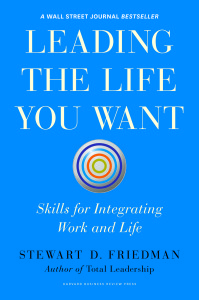 Leading the Life You Want: Skills for Integrating Work and Life
Leading the Life You Want: Skills for Integrating Work and Life
By Stew Friedman, Harvard Business Review Press; September, 2014
You’re busy trying to lead a “full” life. But does it really feel full—or are you stretched too thin? Enter Stew Friedman, Wharton professor, adviser to leaders across the globe, and passionate advocate of replacing the misguided metaphor of “work/life balance” with something more realistic and sustainable. If you’re seeking “balance” you’ll never achieve it, argues Friedman. The idea that “work” competes with “life” ignores the more nuanced reality of our humanity—the interaction of four domains: work, home, community, and the private self. The goal is to create harmony among them instead of thinking only in terms of trade-offs. It can be done.
Building on his national bestseller, Total Leadership, and on decades of research, teaching, and practice as both consultant and senior executive, Friedman identifies the critical skills for integrating work and the rest of life. He illustrates them through compelling original stories of these remarkable people:
Each of these admirable (though surely imperfect) people exemplifies a set of skills—for being real, being whole, and being innovative—that produce a sense of purpose, coherence, and optimism.
Based on interviews and research, their stories paint a vivid picture of how six very different leaders use these skills to act with authenticity, integrity, and creativity—and they prove that significant public success is accomplished not at the expense of the rest of life, but as the result of meaningful engagement in all its parts. With dozens of practical exercises for strengthening these skills, curated from the latest research in organizational psychology and related fields, this book could inspire you, inform you, and instruct you on how to take realistic steps now toward leading the life you truly want.
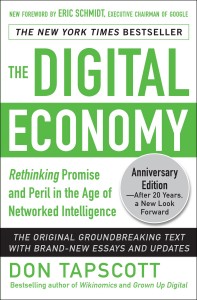 The Digital Economy
The Digital Economy
By Don Tapscott, McGraw-Hill Professional; November 2014
Two decades ago, The Digital Economy changed the way the world thought about the Web and Internet. While everyone else was in awe of “websites” and “dot coms,” Don Tapscott was among the first people to argue that the Internet would fully transform the nature of business and government. It goes without saying that his predictions were spot on.
Now, in this new edition of his classic work, the New York Times bestselling author provides topical updates with a sweeping new analysis of how the Internet has changed business and society in the last 20 years.
When Tapscott was writing the original edition in 1994, he was living in a world where Netscape had been just introduced as go-to browser, websites didn’t do transactions, dial-up was the only way to get online, and mobile phones sightings were rare. Google, YouTube, eBay, Facebook, Twitter? They didn’t exist.
Preserving all the original text as it appeared 20 years ago, this new edition includes detailed essays ending each chapter—Tapscott’s highly informed reflections on his predictions, along with new forecasts of where the digital world is headed.
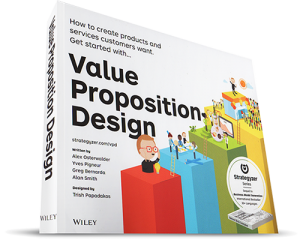 Value Proposition Design: How to Create Products and Services Customers Want
Value Proposition Design: How to Create Products and Services Customers Want
By Alexander Osterwalder and Yves Pigneur, Wiley; November 2014
The authors of the international bestseller Business Model Generation explain how to create value propositions customers can’t resist.
Value Proposition Design helps you tackle a core challenge of every business — creating compelling products and services customers want to buy. This practical book, paired with its online companion, will teach you the processes and tools you need to succeed.
Using the same stunning visual format as the authors’ global bestseller, Business Model Generation, this sequel explains how to use the “Value Proposition Canvas” a practical tool to design, test, create, and manage products and services customers actually want.
The book is for anyone who has been frustrated by business meetings based on endless conversations, hunches and intuitions, expensive new product launches that blew up, or simply disappointed by the failure of a good idea. The book will help you understand the patterns of great value propositions, get closer to customers, and avoid wasting time with ideas that won’t work. You’ll learn the simple but comprehensive process of designing and testing value propositions, taking the guesswork out of creating products and services that perfectly match customers’ needs and desires.
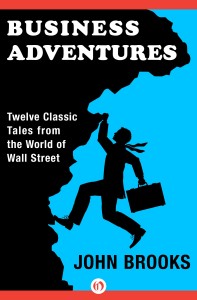 Business Adventures: Twelve Classic Tales from the World of Wall Street
Business Adventures: Twelve Classic Tales from the World of Wall Street
By Brooks, Open Road Media; August 2014
From Wall Street to Main Street, John Brooks, longtime contributor to the New Yorker, brings to life in vivid fashion twelve classic and timeless tales of corporate and financial life in America.
What do the $350 million Ford Motor Company disaster known as the Edsel, the fast and incredible rise of Xerox, and the unbelievable scandals at General Electric and Texas Gulf Sulphur have in common? Each is an example of how an iconic company was defined by a particular moment of fame or notoriety; these notable and fascinating accounts are as relevant today to understanding the intricacies of corporate life as they were when the events happened. Stories about Wall Street are infused with drama and adventure and reveal the machinations and volatile nature of the world of finance.
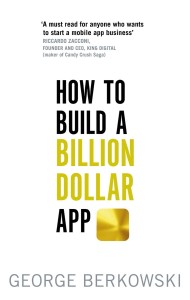 How to Build a Billion Dollar App
How to Build a Billion Dollar App
By George Berkowski, Piatkus, September, 2014
Apps have changed the way we communicate, shop, play, interact and travel and their phenomenal popularity has presented possibly the biggest business opportunity in history.
Serial tech entrepreneur George Berkowski – one of the minds behind the internationally successful taxi hailing app Hailo – gives you exclusive access to the secrets behind the success of the select group of apps that have achieved billion-dollar success.
Berkowski draws exclusively on the inside stories of the billion-dollar app club members, including Instagram, Whatsapp, Snapchat, Candy Crush, Square, Viber, Clash of Clans, Angry Birds, Uber and Flipboard to provide all the information you need to create your own spectacularly successful mobile business. He guides you through each step, from an idea scribbled on the back of an envelope, through to finding a cofounder, building a team, attracting (and keeping) millions of users, all the way through to juggling the pressures of being CEO of a billion-dollar company (and still staying ahead of the competition).
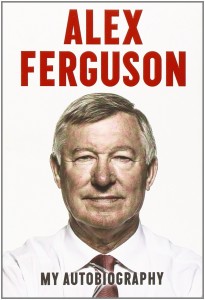 ALEX FERGUSON My Autobiography
ALEX FERGUSON My Autobiography
By Alex Ferguson, Hodder Paperbacks, December 2014
My Autobiography, by Alex Ferguson, is his second autobiography and it presents his experiences and journey as the manager of the football team, Manchester United, from 2000 to 2013. Alex has been the part of Manchester United’s journey from their initial days to their heights of glory and this book is highlights his experiences.
Alex writes about the skills that he believes enabled him to handle the stars of football. He lays a special emphasis on his relationship and chemistry with Cristiano Ronaldo and includes his thoughts about Beckham, Giggs and other football celebrities in the book. Alex discusses his personal thoughts about some of the most-famous football events that occurred in the time period that he spent as manager. He talks of how he didn’t want Ronaldo to join Real Madrid and didn’t support Beckham’s move to join the Los Angeles Galaxy and explains his opinions in detail.
The compelling story of one of football’s most celebrated personalities proves to be a blend of his experiences and teachings.
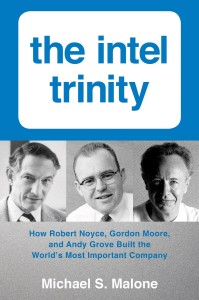 The Intel Trinity: How Robert Noyce, Gordon Moore and Andy Grove Built the World’s Most Important Company
The Intel Trinity: How Robert Noyce, Gordon Moore and Andy Grove Built the World’s Most Important Company
By Michael S. Malone, Harper Business, July 2014
Based on unprecedented access to the corporation’s archives, The Intel Trinity is the first full history of Intel Corporation—the essential company of the digital age— told through the lives of the three most important figures in the company’s history: Robert Noyce, Gordon Moore, and Andy Grove.
Often hailed the “most important company in the world,” Intel remains, more than four decades after its inception, a defining company of the global digital economy. The legendary inventors of the microprocessor – the single most important product in the modern world – Intel today builds the tiny “engines” that power almost every intelligent electronic device on the planet.
But the true story of Intel is the human story of the trio of geniuses behind it. Michael S. Malone reveals how each brought different things to Intel, and at different times. Noyce, the most respected high tech figure of his generation, brought credibility (and money) to the company’s founding; Moore made Intel the world’s technological leader; and Grove, has relentlessly driven the company to ever-higher levels of success and competitiveness. Without any one of these figures, Intel would never have achieved its historic success; with them, Intel made possible the personal computer, Internet, telecommunications, and the personal electronics revolutions.
The Intel Trinity is not just the story of Intel’s legendary past; it also offers an analysis of the formidable challenges that lie ahead as the company struggles to maintain its dominance, its culture, and its legacy.
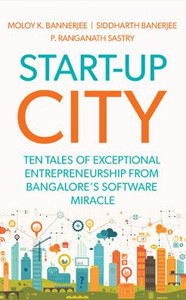 Start-up City: Ten Tales of Exceptional Entrepreneurship from Bangalore’s Software Miracle
Start-up City: Ten Tales of Exceptional Entrepreneurship from Bangalore’s Software Miracle
Authors: Moloy K Bannerjee, Siddharth Bannerjee, P Ranganath Sastry, Collins Business, Dec 2014
Start-up City is about Bangalore and its booming software sector. It looks at how ten successful first-generation entrepreneurs got to where they are, what they learned along the way and ultimately, why they chose Bangalore as their start-up city. In the process, it explores questions like: What makes successful entrepreneurs tick? Is it in their nature, or is it a function of how they were nurtured? What compels them to engage in unconventional, high-risk ventures?
For anyone interested in Indian entrepreneurship, the struggles and eventual successes of these entrepreneurs will make for interesting and relevant reading. It could benefit young and ambitious entrepreneurs who may be looking for inspirational, yet accessible, examples to follow on their own journeys.








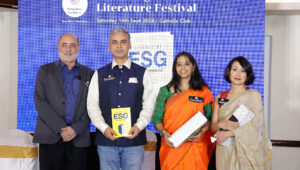


Recent Comments